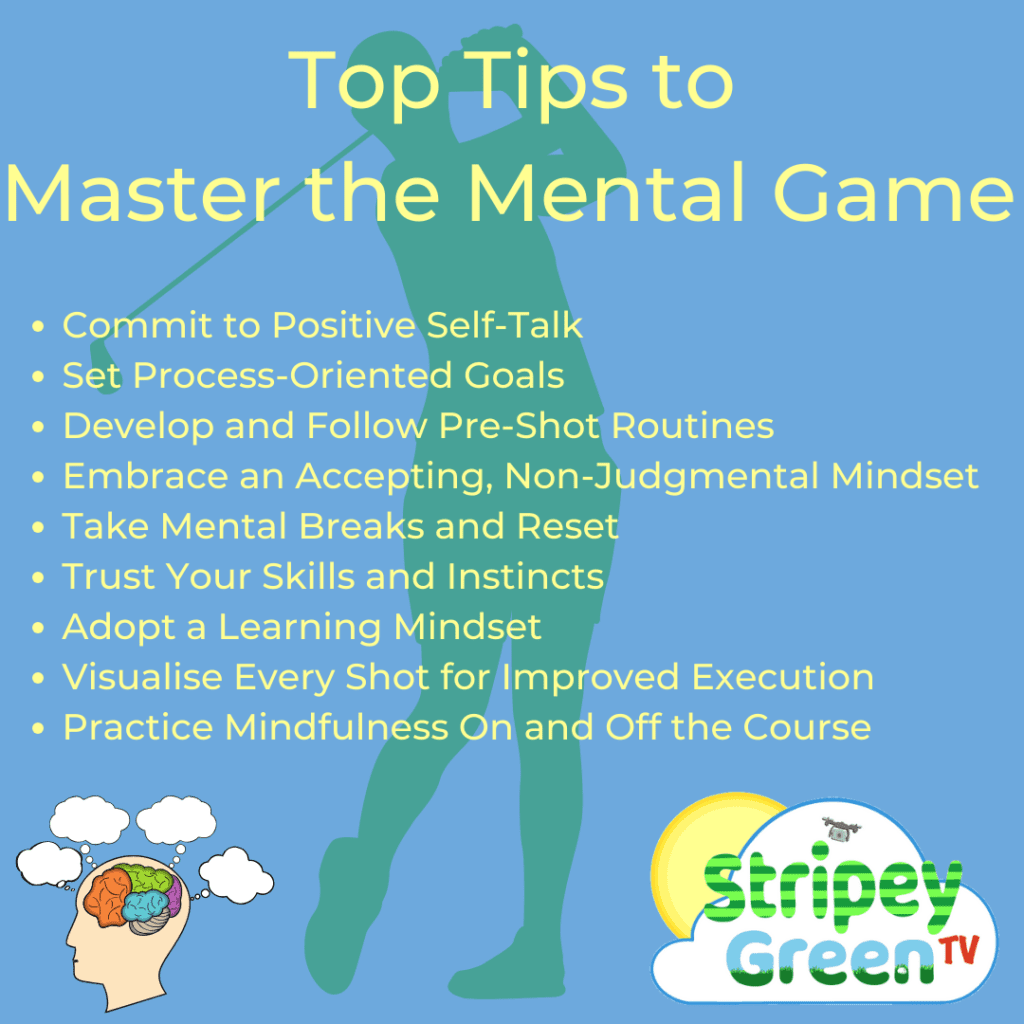Mastering the Mental Game: Tips for Golfers to Improve Focus and Performance on the Course

Golf is often described as a mental game. Success on the course requires intense concentration, discipline, and the ability to overcome frustration. Mastering the mental side of golf can help players reach new levels of performance. Here are some key tips for golfers looking to improve their mental game.
Commit to Positive Self-Talk
The way golfers talk to themselves before, during, and after play significantly impacts their performance. Negative self-talk such as “I’m no good at putting” or “I always hit bad shots when I’m nervous” becomes a self-fulfilling prophecy. Reframing that internal dialogue into positive affirmations like “I’m a great putter” or “I thrive under pressure” is essential. Setting aside time before a round to visualise successful shots builds confidence. Celebrating good shots and letting go of bad ones keeps the mindset constructive. The mental game starts with positive self-talk.
Set Process-Oriented Goals
Many golfers fall into the trap of outcome-oriented thinking, constantly measuring themselves against rigid expectations like scores or finishing position. However, focusing on controllable processes proves much more effective. Rather than thinking about shooting under par or beating an opponent, golfers should set goals related to execution, like “I want to take my time and go through my pre-shot routine on every swing.” Process-oriented goals minimise pressure and help golfers get out of their own heads. Keeping the mind concentrated on step-by-step processes enhances enjoyment and performance.
Develop and Follow Pre-Shot Routines
Establishing consistent pre-shot routines prevents golfers’ minds from wandering and promotes ideal focus. An effective routine might involve taking two practice swings, visualising the shot, and taking a deep breath. When golfers repeat the same mental cues before each strike, the routine becomes automatic over time. This routine narrows focus to the most essential elements and clears the mind of unnecessary thoughts. Most importantly, it anchors attention to the present moment.
Embrace an Accepting, Non-Judgmental Mindset
Golfers often become their own worst critics, harshly judging poor shots or growing frustrated at mistakes. This judgmental mindset only breeds more tension and anger. By accepting each shot outcome with equanimity – good or bad – golfers gain peace of mind. Rather than labelling a shot as “horrible,” golfers should acknowledge it neutrally and move forward. Similarly, letting go of comparisons between one’s skills and an opponent’s abilities helps golfers stay grounded. Maintaining perspective and accepting each shot for what it is allows optimal focus on the next one.
Take Mental Breaks and Reset
During a round, golfers’ mental energy and concentration naturally fluctuate. Taking brief mental breaks becomes essential when focus wavers or frustration sets in. Stepping away after a shot, grabbing a drink of water, or chatting with a playing partner gives the mind a chance to reset. Simple deep breathing also helps clear tension when it builds up. Releasing distracting thoughts and emotions prevents them from compounding and interfering with future shots. By pressing pause and giving the mind a break, golfers can renew their composure.

Trust Your Skills and Instincts
Overthinking often plagues golfers during play – second-guessing club selection or stroke strategy breeds hesitation and doubt. The best antidote is trusting skills and instincts. Golfers should remind themselves of the countless hours spent honing their swing and course management abilities. That preparation translates into an intuitive sense of what club to hit or where to aim each shot. Rather than overanalysing, golfers need to let their subconscious take over. Silencing the inner critic and having faith in skills allows instinct to guide the way.
For professional golfers, having confidence in skills and instincts is especially important, given the pressure of golf betting odds. If golfers get caught up in the betting lines or oddsmakers’ predictions, they may question their abilities. But by silencing the outside noise and fully trusting preparation, golfers can thrive regardless of what the odds indicate.
Adopt a Learning Mindset
Golf is a game of mistakes – errant shots and penalty strokes happen to everyone. How golfers respond to errors hugely impacts performance. Rather than dwelling on a hook or slice, golfers need to frame them as opportunities for improvement. Analysing why the mistake happened and making subtle corrections embodies a learning mindset. Whether it’s a mental or swing issue, there is always room for incremental progress. Golfers who embrace this mindset are never fully satisfied with their game and constantly work to sharpen skills and knowledge. These improvements can be implemented using the principles of Atomic Habits.
Visualise Every Shot for Improved Execution
Beyond positively self-talking, visualisation is another essential mental technique for golfers. Research shows that mentally picturing a successful shot ahead of time activates the brain in ways that prime the body for proper execution. To harness this, golfers should set up, visualise the perfect swing path and trajectory, imagine the ball landing in the desired spot, and feel the positive emotions of a great shot. This visualisation routine aligns the mind and body to turn the image into reality.
Taking 30 seconds before hitting and picturing the shot in your head will lead to more solid contact, accurate distance, and consistent ball-striking. The brain guides the body, so visualising perfection is vital.
Practice Mindfulness On and Off the Course
General mindfulness practices outside golf also assist with mental focus during play. Activities like meditation, deep breathing, and yoga have been shown to reduce stress, increase concentration, and promote being present in the moment – all crucial for golf. Further, getting adequate sleep, eating nutritious foods, and exercising regularly keeps the mind sharp and attentive. Golfers who commit to daily mindfulness benefit from reduced mental fatigue, improved resilience after mistakes, and increased awareness during shots. Making mindfulness a lifestyle leads to substantial gains in focus, composure, and enjoyment both on and off the course.
Conclusion – Golf’s Metal Game
Mastering the intricate mental game is essential for golfers striving to reach their potential. By curbing negative thinking, implementing pre-shot routines, accepting mistakes, taking mental breaks, trusting instincts, and adopting a learning mindset, golfers can hone mental sharpness.
Visualisation and general mindfulness practices also boost focus and composure during play. With dedication to these cognitive techniques and a positive mindset, golfers can achieve heightened performance and enjoyment on the course. While the swing provides the power, the mind offers the guidance and control. Making the mental game a top priority will drive rapid improvements for any golfer.
Interested in finding out more? Why not checkout our Golf Book Reviews and see what further reading might elevate your game.
Bye for now!

